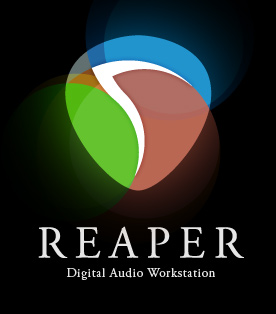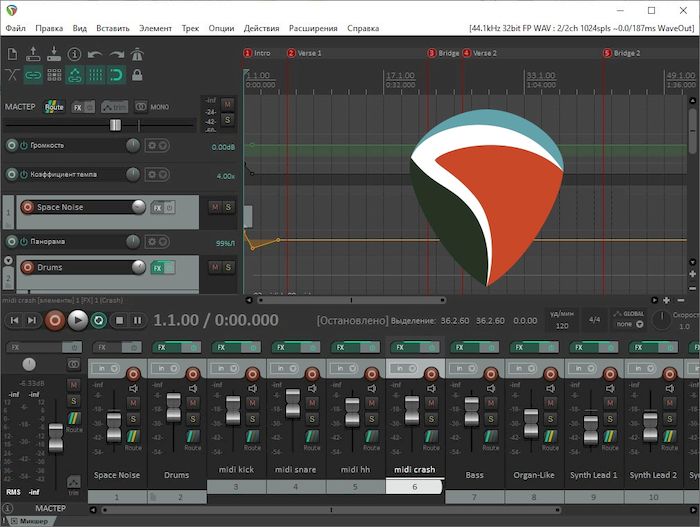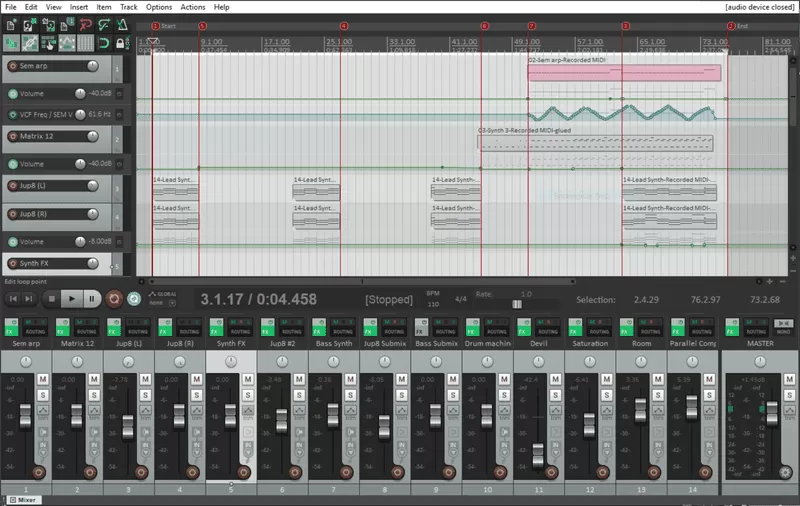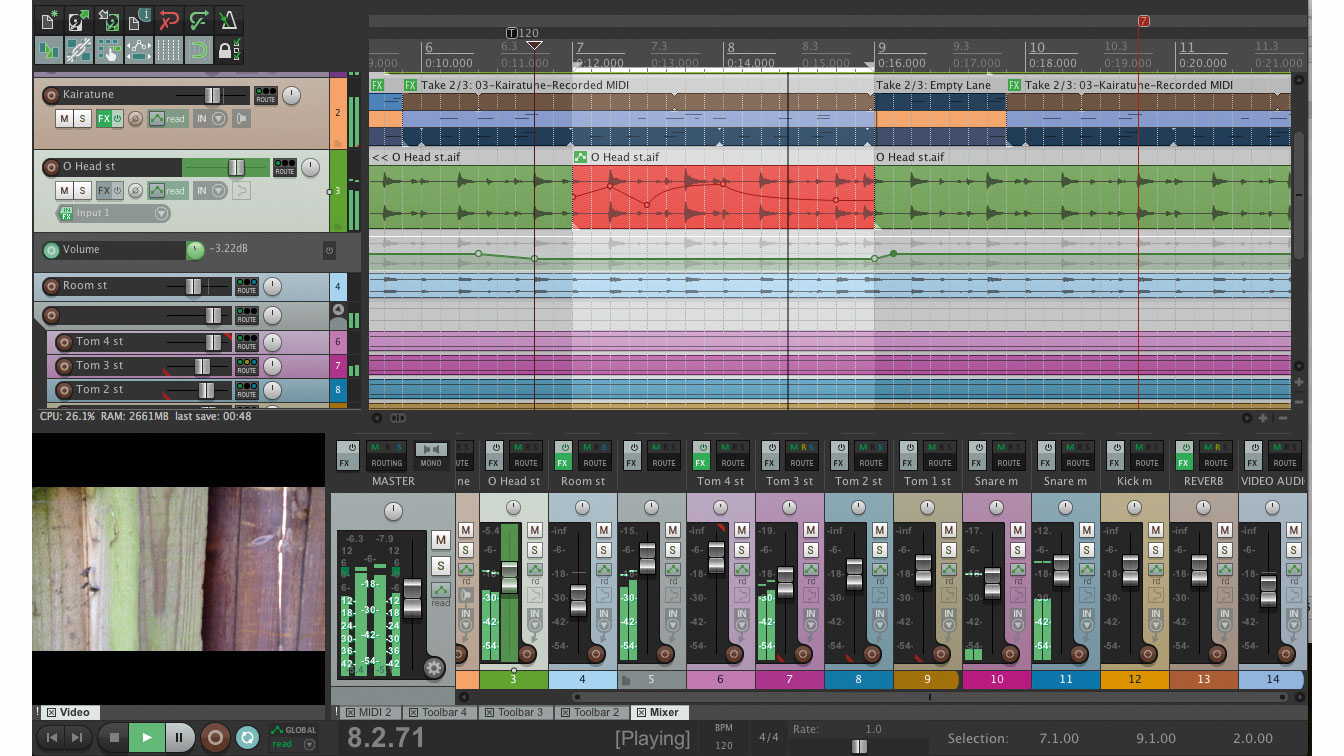
Cockos Reaper (Activation number included)
Last Updated:7-07-2024, 23:35
Cockos reaper vs presonus studio one
About
Are you torn between Cockos REAPER and PreSonus Studio One? Choosing the right Digital Audio Workstation (DAW) can be a daunting task, but fear not! We're here to guide you through the key features, strengths, and unique offerings of each platform to help you make an informed decision.
First up, Cockos REAPER: Known for its incredible flexibility and affordability, REAPER offers a robust set of tools for audio recording, editing, and mixing. Its lightweight design and customizable interface make it a favorite among both beginners and seasoned professionals.
On the other hand, PreSonus Studio One: This DAW boasts an intuitive, user-friendly interface and seamless integration with PreSonus hardware. Studio One is praised for its powerful production capabilities, including advanced mastering tools and a comprehensive suite of virtual instruments and effects.
So, which one is right for you? Read on to explore the detailed comparison and find out why one might suit your needs better than the other!
Overview of Cockos REAPER and PreSonus Studio One
When it comes to digital audio workstations (DAWs), Cockos REAPER and PreSonus Studio One are two prominent choices that cater to a wide range of music producers, sound engineers, and audio enthusiasts. Both offer powerful features and flexible workflows, but they each have their unique strengths and target audiences. In this overview, we'll delve into the key aspects of each DAW to help you decide which might be the best fit for your needs.
Cockos REAPER
REAPER, developed by Cockos, is renowned for its flexibility, efficiency, and affordability. It's a lightweight yet robust DAW that can handle everything from simple recording tasks to complex audio production projects.
Customizability: REAPER offers extensive customization options, allowing users to tailor the interface and functionality to their specific needs. Performance: It is highly optimized for performance, making it suitable for both low-spec and high-end systems. Scripting and Extensions: Users can extend REAPER's capabilities through scripting, which opens up a world of possibilities for advanced users.PreSonus Studio One
PreSonus Studio One, on the other hand, is designed with a focus on ease of use and a streamlined workflow. It's a comprehensive DAW that appeals to both beginners and professionals alike.
User Interface: Studio One boasts a clean and intuitive interface that makes navigation and project management straightforward. Integration: It integrates seamlessly with other PreSonus hardware and software, providing a cohesive ecosystem for users. Song to Stage Workflow: Studio One's unique workflow allows users to move effortlessly from songwriting to mixing to live performance.Both REAPER and Studio One offer robust features and have dedicated user bases. Your choice between the two will largely depend on your specific needs, preferences, and the type of audio projects you plan to undertake. Whether you prioritize customization and performance or ease of use and integration, both DAWs have the potential to meet and exceed your expectations.
Ease of Use: Cockos REAPER vs PreSonus Studio One
User Interface and Navigation
When it comes to the user interface, both Cockos REAPER and PreSonus Studio One offer intuitive designs that cater to both beginners and professionals. REAPER, however, stands out with its highly customizable layout, allowing users to tailor the workspace to their specific needs. This flexibility means that you can arrange panels, docks, and windows in a way that maximizes your workflow efficiency. On the other hand, Studio One provides a more structured interface that is sleek and visually appealing, making it easier for new users to get started without feeling overwhelmed.
Learning Curve
The learning curve for both DAWs (Digital Audio Workstations) varies significantly. REAPER might initially seem daunting due to its extensive customization options and vast array of features. However, its powerful scripting capabilities and community support make it easier for users to adapt and create personalized workflows. In contrast, Studio One offers a more guided approach with its Show Me feature, which provides on-screen tips and tutorials, making it more user-friendly for those who prefer a more straightforward learning path.
Conclusion
Ultimately, the ease of use for Cockos REAPER and PreSonus Studio One depends on your personal preferences and workflow requirements. If you value flexibility and customization, REAPER might be the better choice. However, if you prefer a more structured and visually appealing interface with built-in guidance, Studio One could be the ideal option for you.
Feature Comparison: Cockos REAPER and PreSonus Studio One
User Interface and Ease of Use
When it comes to the user interface, both Cockos REAPER and PreSonus Studio One offer unique approaches that cater to different user preferences. REAPER provides a highly customizable interface, allowing users to arrange their workspace according to their workflow. This flexibility can be particularly appealing to advanced users who require specific setups for their projects. On the other hand, Studio One features a more streamlined and visually appealing interface that is designed to be intuitive for beginners and professionals alike. Its drag-and-drop functionality and clear layout make it easy to navigate, even for those new to digital audio workstations (DAWs).
Audio and MIDI Capabilities
Both REAPER and Studio One excel in their audio and MIDI processing capabilities, but they each have their strengths. REAPER is known for its robust MIDI editing tools and extensive customization options, making it a favorite among composers and sound designers. It also supports a wide range of audio formats and offers excellent performance in terms of latency and processing power. Studio One, meanwhile, integrates seamlessly with other PreSonus hardware and software, providing a cohesive ecosystem for users. Its advanced audio editing features, such as Melodyne integration, and its intuitive MIDI workflow make it a strong contender for both recording and production tasks.
REAPER: Highly customizable interface Extensive MIDI editing tools Supports a wide range of audio formats Low latency and high processing power Studio One: Streamlined and visually appealing interface Seamless integration with PreSonus ecosystem Advanced audio editing features Intuitive MIDI workflowUltimately, the choice between Cockos REAPER and PreSonus Studio One will depend on your specific needs and preferences. Whether you prioritize customization and advanced MIDI capabilities, or a more intuitive interface and integrated ecosystem, both DAWs offer powerful features to enhance your music production experience.
Performance and Stability: A Detailed Look
When it comes to digital audio workstations (DAWs), performance and stability are paramount. Both Cockos REAPER and PreSonus Studio One offer robust features, but how do they stack up in terms of performance and stability? Let's delve into the specifics.
Resource Utilization: REAPER is renowned for its low system resource usage. It runs efficiently on a wide range of hardware, making it a great choice for users with older or less powerful systems. Studio One, while slightly more resource-intensive, still performs well on modern hardware. Its interface and features can sometimes require more processing power, but it generally offers smooth performance. Stability: REAPER is known for its rock-solid stability. Users often report fewer crashes and issues, even when running complex projects with multiple plugins and tracks. Studio One also boasts a stable platform, with regular updates from PreSonus addressing any stability concerns. However, like any software, it can occasionally experience issues, especially with third-party plugins. Compatibility: REAPER supports a vast array of audio and MIDI hardware, as well as third-party plugins. Its compatibility with various systems and setups is one of its strong points. Studio One is also highly compatible, with support for a wide range of hardware and plugins. PreSonus has done a good job ensuring that Studio One works well with most industry-standard equipment. Update and Support: REAPER receives regular updates, with the development team actively addressing user feedback and bugs. The community support is also robust, with an active forum and user base. Studio One benefits from frequent updates and a dedicated support team from PreSonus. The company's commitment to improving the software is evident in its regular feature additions and bug fixes.In conclusion, both REAPER and Studio One offer solid performance and stability, but they cater to slightly different user needs. REAPER's efficiency and compatibility make it a top choice for users with limited hardware resources, while Studio One's feature-rich environment appeals to those with more powerful systems and a preference for a polished interface.
Pricing and Value for Money
When comparing Cockos REAPER and PreSonus Studio One, the pricing structure and overall value for money are crucial factors to consider. Both software options cater to different needs and budgets, offering distinct advantages that can significantly impact your workflow and financial planning.
Cockos REAPER Pricing
Cockos REAPER offers a highly flexible pricing model that stands out in the market. Users can purchase a license for a one-time fee of $60 for non-commercial use or $225 for commercial use. This cost-effective approach makes REAPER an attractive option for beginners, hobbyists, and professionals alike. Additionally, REAPER provides a fully functional 60-day trial, allowing users to extensively test the software before making a purchase decision.
PreSonus Studio One Pricing
PreSonus Studio One follows a more traditional subscription-based model with tiered pricing options. The Prime version is available for free, but it comes with limited features. For more comprehensive functionality, users can opt for Studio One Professional, which costs $399 for a perpetual license or $9.95 per month for a subscription. This pricing structure provides users with the flexibility to choose between a one-time purchase or a monthly commitment, catering to different financial preferences and usage scenarios.
In summary, both Cockos REAPER and PreSonus Studio One offer competitive pricing strategies that cater to a wide range of users. REAPER's affordable one-time fees and extensive trial period make it an excellent choice for budget-conscious individuals, while Studio One's tiered pricing and comprehensive features appeal to those seeking a more robust and versatile solution.
Community and Support: Cockos REAPER and PreSonus Studio One
When it comes to digital audio workstations (DAWs), the community and support available can significantly influence your experience. Both Cockos REAPER and PreSonus Studio One boast active communities and robust support systems, but they each have their unique strengths.
Cockos REAPER Community and Support
REAPER's community is known for its passion and dedication. Here are some key aspects:
Forums: The REAPER forums are a bustling hub where users can seek advice, share projects, and discuss new features. The community is highly engaged, and many experienced users are always ready to help. Wiki: Cockos provides an extensive wiki that covers everything from basic setup to advanced scripting, making it a valuable resource for users of all skill levels. Online Tutorials: A plethora of tutorials, both official and user-generated, are available on platforms like YouTube and Vimeo, offering step-by-step guidance on various aspects of REAPER. Annual User Conference: REAPER holds an annual conference called REAPER Con, where users can attend workshops, listen to presentations, and network with other enthusiasts.PreSonus Studio One Community and Support
PreSonus Studio One also has a strong community and support network, with the following highlights:
User Forums: PreSonus hosts active forums where users can discuss techniques, troubleshoot issues, and showcase their work. The forums are moderated by PreSonus staff, ensuring a high level of support. Knowledge Base: PreSonus offers a comprehensive knowledge base with articles, videos, and FAQs, providing detailed information on using Studio One effectively. Online Courses: PreSonus Academy offers a range of courses and certifications, helping users to master Studio One through structured learning paths. Community Events: PreSonus frequently organizes webinars, live streams, and community events, allowing users to interact directly with the developers and other users.Both Cockos REAPER and PreSonus Studio One offer strong community and support networks, making them excellent choices for both beginners and professionals. Whether you prefer the extensive wiki and tutorials of REAPER or the structured courses and events of Studio One, you'll find ample resources to enhance your music production journey.
Integration with Hardware and Other Software
Both Cockos REAPER and PreSonus Studio One offer robust integration with a variety of hardware and software solutions, enhancing their functionality and versatility in professional audio production environments. Here's a detailed look at how each DAW (Digital Audio Workstation) integrates with external devices and other software:
Cockos REAPER
Hardware Compatibility: REAPER supports a wide range of audio interfaces and MIDI devices, ensuring seamless connectivity with popular brands like Focusrite, Universal Audio, and more. Its flexible routing capabilities allow for complex setups with multiple hardware inputs and outputs. Software Integration: REAPER excels in integrating with other software tools. It supports VST, AU, and JS plug-in formats, enabling users to leverage a vast array of third-party effects and instruments. Additionally, REAPER's API allows for custom scripting and extensions, enhancing its functionality through user-created tools.PreSonus Studio One
Hardware Compatibility: Studio One is designed to work effortlessly with PreSonus hardware, such as the StudioLive series of mixers. It also supports a wide range of third-party audio interfaces and MIDI controllers, providing a smooth workflow for users. Software Integration: Studio One integrates seamlessly with other software, supporting VST, AU, and AAX plug-ins. It also features native integration with Melodyne for advanced pitch correction, and its collaboration with Notion music notation software allows for easy score creation and editing within the DAW.Both REAPER and Studio One offer comprehensive integration options, making them versatile choices for audio professionals who require compatibility with a wide array of hardware and software tools. Whether you prioritize extensive scripting capabilities or native integration with specific software, both DAWs provide the necessary features to support a robust audio production workflow.
Final Thoughts: Choosing Between Cockos REAPER and PreSonus Studio One
When it comes to digital audio workstations (DAWs), the choice between Cockos REAPER and PreSonus Studio One can be a challenging one. Both platforms offer robust features and cater to a wide range of users, from beginners to professionals. Here, we'll break down some key considerations to help you make an informed decision.
User Interface and Ease of Use
REAPER's interface is highly customizable, allowing users to tailor the layout to their specific needs. This flexibility can be a double-edged sword; while it offers unparalleled personalization, it might require more time to set up initially. On the other hand, Studio One boasts a sleek, intuitive interface that is often praised for its ease of use, making it a great choice for newcomers to the world of DAWs.
Feature Set and Performance
Both REAPER and Studio One offer extensive feature sets, but they cater to slightly different needs. REAPER is known for its efficiency and low resource usage, making it an excellent choice for users with less powerful hardware. Studio One, meanwhile, integrates seamlessly with other PreSonus hardware and offers a more polished, all-in-one solution for music production and audio engineering.
Ultimately, the choice between Cockos REAPER and PreSonus Studio One will depend on your specific needs, budget, and workflow preferences. Consider what aspects are most important to you and how each DAW aligns with your goals in music production or audio engineering.


